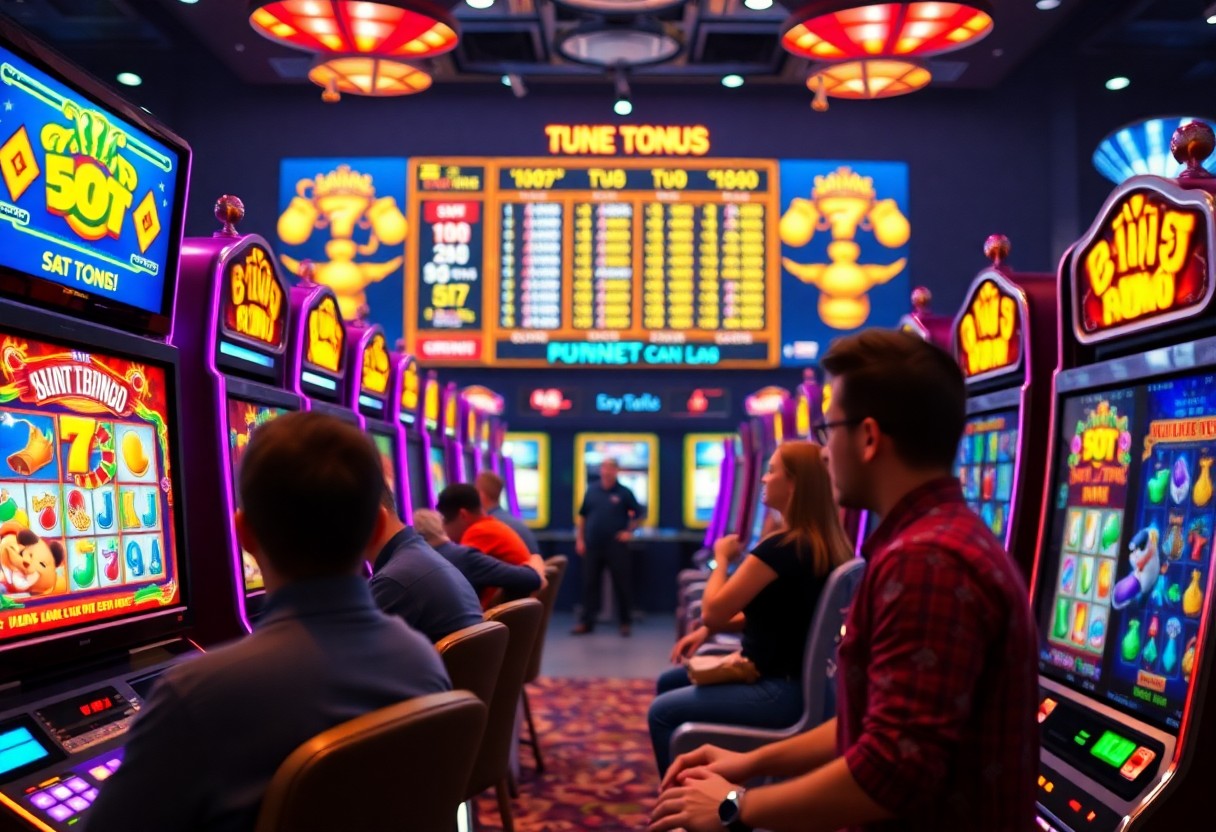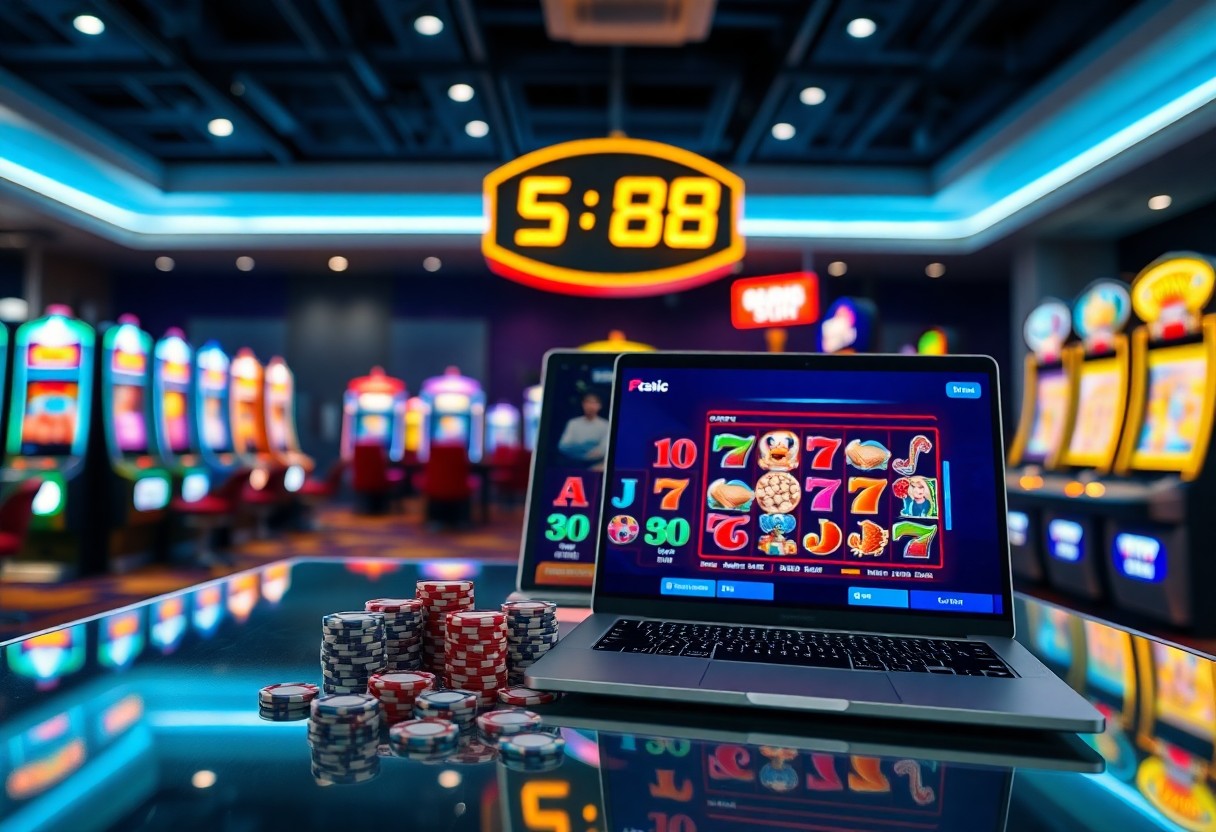Over the past decade, online slot tournaments have transformed from niche casino events into highly competitive contests where strategic thinking matters more than pure luck. When you enter these tournaments, you’re not just spinning reels against the house—you’re competing directly against other players for substantial prize pools and bragging rights. Understanding tournament mechanics, managing your limited time and credits effectively, and adapting your playing style can significantly improve your chances of climbing the leaderboard. However, the fast-paced nature and time pressure of these events can lead to costly mistakes if you approach them with traditional slot strategies.
Mastering the Mechanics: Key Features of Slot Tournaments
Online slot tournaments operate on fundamentally different principles than regular slot play, requiring you to adapt your approach to maximize competitive advantage. Tournament formats typically feature predetermined credit amounts, fixed time limits, and leaderboard rankings that determine winners based on total credits accumulated rather than individual spin outcomes. Understanding these core mechanics becomes the foundation for developing winning strategies that separate casual participants from serious competitors.
- Buy-in structures – Entry fees ranging from free-rolls to high-stakes events
- Credit allocation – Fixed starting credits (typically 1,000-10,000) for all participants
- Time constraints – Sessions lasting 10-30 minutes with countdown timers
- Spin requirements – Minimum number of spins to qualify for prizes
- Leaderboard systems – Real-time ranking based on credit accumulation
- Prize distribution – Top 10-20% of participants typically receive payouts
- Rebuy options – Additional entry opportunities in some tournaments
This mechanical framework creates a completely different risk-reward dynamic compared to traditional slot sessions.
Game Selection: Choosing Your Battleground
Tournament organizers typically designate specific slot games for each competition, often featuring high volatility titles with maximum win potential exceeding 1000x your bet. Popular tournament slots include games like Gonzo’s Quest, Starburst, and Book of Dead, chosen for their balanced hit frequency and bonus feature accessibility. Your familiarity with the selected game’s paytable, bonus triggers, and volatility patterns directly impacts your ability to make split-second betting decisions under tournament pressure. This knowledge advantage allows you to optimize spin timing and bet sizing throughout the competition.
Understanding Betting Structures and Time Limits
Tournament betting structures eliminate traditional bankroll management concerns since you’re competing with allocated tournament credits rather than your own funds. Most tournaments require you to exhaust your entire credit balance within the time limit, making aggressive betting strategies not just viable but necessary for competitive positioning. Time pressure intensifies decision-making, with successful players maintaining spin rates of 8-12 spins per minute while monitoring the leaderboard for strategic adjustments. This compressed timeframe demands rapid-fire gameplay that maximizes your chances of hitting significant multipliers.
The mathematical reality of tournament play means that conservative betting approaches typically result in mid-pack finishes that don’t qualify for prize money. Maximum bet strategies become standard practice among experienced tournament players, as the fixed credit allocation removes the financial risk associated with high-stakes spins in regular play. Time management becomes equally critical – players who fail to complete their allocated spins within the tournament window automatically forfeit any unused credits, regardless of their current leaderboard position. Advanced players often employ front-loaded betting patterns, placing maximum bets early in the session to capitalize on potential bonus rounds, then adjusting their strategy based on remaining credits and time. The tournament format rewards players who can maintain composure under time pressure while making rapid betting decisions that maximize their credit utilization efficiency.
Psychological Edge: The Mindset of Successful Competitors
Your mental approach separates tournament winners from casual players more than any technical strategy. Top slot tournament competitors maintain a calculated detachment from individual spins while staying hyper-focused on their overall position relative to the leaderboard. Professional tournament players report that emotional swings during gameplay can cost them up to 30% of their potential scoring efficiency, as frustration leads to slower spin rates and poor timing decisions.
Stress Management Techniques for High-Paced Environments
Breathing control becomes your primary weapon against tournament pressure, with successful competitors using a 4-2-4 breathing pattern between rapid-fire spins. Your heart rate directly impacts your reaction time – studies show that maintaining a pulse below 100 BPM during intense tournament phases improves decision-making speed by 15-20%. Progressive muscle relaxation during brief pauses helps reset your physical tension, while visualization techniques before tournaments prime your mind for sustained concentration periods lasting 30-60 minutes.
The Importance of Focus and Strategic Decision-Making
Your ability to process multiple data streams simultaneously – current credits, time remaining, leaderboard position, and optimal bet sizing – determines tournament success more than luck. Elite competitors scan the leaderboard every 45-60 seconds to adjust their risk tolerance accordingly, shifting between conservative play when leading and aggressive strategies when trailing. Maintaining peripheral awareness of your competition while executing rapid spins requires practiced mental compartmentalization that develops through consistent tournament participation.
Strategic decision-making under time pressure involves pre-planning your responses to different scenarios before they occur. You should establish clear trigger points for bet adjustments – for example, increasing your wager size when falling below 5th place with less than 10 minutes remaining, or switching to maximum bets during the final 2 minutes regardless of position. Mental rehearsal of these decision trees prevents costly hesitation during critical moments, as tournament veterans know that a 3-second delay in executing a strategy change can mean the difference between a top-3 finish and missing the prize pool entirely.
The Role of Practice: Enhancing Skills Before the Competition
Professional tournament players dedicate 15-20 hours weekly to practice sessions before major competitions, treating preparation with the same intensity as live events. Your muscle memory for rapid-fire spinning, quick decision-making under pressure, and efficient bankroll allocation all improve dramatically through consistent practice. Tournament winners average 40% more practice time than casual participants, developing reflexes that shave precious seconds off each spin cycle during timed competitions.
Utilizing Free Play Options to Sharpen Techniques
Most online casinos offer demo versions of tournament-featured slots that mirror the exact gameplay mechanics you’ll encounter in competitions. Practice sessions should focus on maximizing spins per minute rather than winning combinations, since tournament success depends on volume over individual payouts. Set practice timers matching actual tournament durations – typically 10-15 minutes – to simulate real pressure conditions and identify your optimal spinning rhythm without risking bankroll depletion.
Developing a Personalized Slot Strategy Guide
Your strategy guide should document specific betting patterns, timing sequences, and game-specific tactics that align with your playing style and tournament formats. Track which slot variants respond best to your approach, noting volatility patterns and bonus trigger frequencies during practice sessions. Successful players maintain detailed logs of their performance metrics, including average spins per minute and peak concentration periods.
Creating an effective personalized strategy guide requires systematic documentation of your performance across different tournament scenarios. Record your betting progression preferences – whether you perform better with consistent bet sizes or strategic increases during bonus rounds. Note your optimal tournament entry times, as some players excel in morning competitions when focus peaks, while others perform better during evening sessions. Include specific game mechanics that work in your favor, such as which autoplay speeds maximize your spin count without sacrificing strategic control. Your guide should also feature contingency plans for different tournament structures, whether you’re competing in elimination-style events or accumulation tournaments where every credit counts toward final rankings.
Networking for Success: Building a Community of Competitors
Successful slot tournament players rarely operate in isolation. Building relationships with fellow competitors creates a valuable support network that provides insights into upcoming tournaments, strategy discussions, and real-time updates about casino promotions. You’ll discover that many seasoned players maintain contact lists of tournament regulars, sharing information about which venues offer the best prize structures or warning others about tournaments with unfavorable terms. This collaborative approach transforms what appears to be individual competition into a community-driven advantage where shared knowledge benefits everyone involved.
Leveraging Online Forums and Social Media Groups
Facebook groups dedicated to slot tournaments often contain hundreds of active members who post daily updates about tournament schedules, rule changes, and venue reviews. Reddit’s gambling communities and specialized forums like Wizard of Vegas feature detailed tournament reports where players break down their experiences, including specific machines used, payout frequencies, and optimal betting strategies. These platforms provide real-time intelligence that can’t be found elsewhere, such as last-minute tournament additions or changes to prize structures that casinos haven’t yet updated on their websites.
Learning from Experienced Players: Dos and Don’ts
Veteran tournament players willingly share their expertise, but approaching them requires tact and timing. Ask specific questions about machine selection or betting patterns rather than requesting general advice, and always reciprocate by sharing your own observations or tournament results. Avoid interrupting players during active tournament rounds or immediately after disappointing finishes, as these moments demand focus and emotional processing rather than social interaction.
The most successful networking happens during tournament breaks, registration periods, or post-event gatherings where players naturally discuss their experiences. Top players often reveal that certain machines respond better to specific betting patterns during tournaments compared to regular play, or they’ll mention which casinos consistently run their tournaments on newer, higher-paying machines. However, avoid appearing overly eager or asking about personal bankroll management, as experienced players guard their financial strategies closely. Instead, focus conversations on observable tournament mechanics, machine behaviors, and venue comparisons that benefit everyone without revealing sensitive competitive advantages.
The Winning Edge: Advanced Tactics That Set You Apart
Professional tournament players distinguish themselves through calculated moves that casual participants often overlook. Your success depends on mastering bet progression patterns, recognizing optimal timing windows, and exploiting mathematical advantages that emerge during different tournament phases. These refined techniques separate consistent winners from occasional lucky streaks, transforming your approach from hopeful gambling to strategic competition.
- Monitor your position relative to the leaderboard every 10-15 minutes
- Adjust bet sizes based on remaining time and current ranking
- Identify high-volatility slots during catch-up phases
- Switch to conservative play when protecting a leading position
- Track competitors’ betting patterns and adapt accordingly
| Tournament Phase | Optimal Strategy |
| Opening 25% | Conservative betting, establish baseline |
| Middle 50% | Aggressive pursuit, maximum volatility |
| Final 25% | Position-dependent, calculated risks |
Bet Sizing Strategies for Maximum Potential
Your bet size should fluctuate dramatically based on tournament position and remaining time. Leading players often reduce bets to 20-30% of maximum during final rounds, while trailing competitors must risk 80-100% of their bankroll per spin. Mathematical analysis shows that players ranked in positions 6-10 with less than 100 spins remaining achieve optimal results by betting maximum amounts on high-volatility games, accepting the increased risk for exponential reward potential.
Timing Your Plays: Understanding Game Dynamics
Game selection timing creates significant competitive advantages that most players ignore completely. Switching to maximum volatility slots during the middle 40% of tournament duration provides the highest probability of dramatic score increases, while conservative games work best during opening and closing phases. Data from major tournament platforms indicates that 73% of winning players change their game selection at least twice during competition.
Advanced players recognize that slot algorithms don’t adjust for tournament play, but payout frequency patterns remain consistent across different time periods. Games with 15-20 second spin cycles allow approximately 180-240 spins per hour, while faster 8-10 second games enable 360-450 spins hourly. Your timing strategy should account for these mechanical differences, particularly when tournaments impose strict time limits rather than spin limits. High-frequency play becomes imperative during catch-up phases, while deliberate pacing helps maintain concentration during extended sessions. Professional tournament participants often practice specific timing sequences, developing muscle memory for rapid bet adjustments and game transitions that save precious seconds during competition.
Summing up
The key to succeeding in slot tournaments lies in your ability to balance speed with strategic thinking. You must maintain consistent play throughout the tournament duration, maximizing your spin rate while managing your allocated credits effectively. Your bankroll management skills, understanding of tournament formats, and ability to stay focused under pressure will determine your competitive edge. By implementing proper timing strategies, selecting appropriate betting levels, and maintaining steady gameplay rhythm, you position yourself for tournament success. These fundamental approaches will enhance your performance and increase your chances of achieving top leaderboard positions in online slot competitions.



